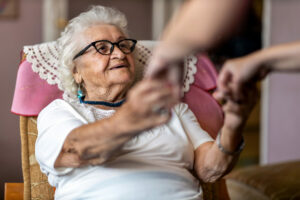In this post
Childminding is a wonderful way to balance a desire to work with children and a desire to work within your own home. Not sure exactly what a childminder is? Keep reading to find out more and how to get into the field if you’re interested.
Working as a childminder can be an incredibly rewarding career, and is one that is best suited to individuals that are calm and patient, and that have a genuine love for children. There’s a lot more to childminding than simply ‘babysitting’ children for a couple of hours: your role in a childminder job will involve delivering high-quality early years education and engagement, and building the confidence and personalities of the young people in your care.
Here’s everything you need to know about how to become a childminder, including the best ways to secure childminder jobs and the type of childminder salary you can expect to earn
What is a Childminder?
Under the Children [NI] Order 1995 a Registered Childminder is defined as: “A person acts as a childminder if – (a) they look after one or more children under the age of twelve for reward; and (b) the period, or the total of the periods, which they spend so looking after children in any day exceeds two hours.” Additionally, the UK Government further specify that a childminder is an individual who is paid directly by a parent or primary caregiver to provide childcare in their own home for children up to the age of eight years old. Most childminders work alone, but if they’d like to care for a larger number of children at any one time, they can also work in conjunction with up to two additional childminders.
The working hours involved in becoming a childminder will depend on the type of childminding services you are offering. Most childminders will offer some or all of the following services:
- School drop-off and/or pick-up services. These are generally beneficial for working parents
- School holiday-only care for school-aged children
- Part-time or full-time childcare for children who are not yet of school age
- Some weekend or overnight services for families who undertake shift work
Childminders work from their own domestic residences (usually their own homes) and often groups of children are cared for together at any one time. The childminder’s own children may also be present, which makes childminding an attractive proposition for parents who are looking for a career that will work around their own childcare needs.

Personal Qualities of a Childminder
If you’re considering embarking on a career as a childminder then you might be wondering what personal qualities would best suit someone looking for childminder jobs. One of the most important traits that you should possess to be successful in this industry is a genuine love for children. It is only by enjoying being around children, and having a genuine appreciation of their company, that you will be in the best position to provide a high standard of childcare.
Other qualities and skills that would certainly be beneficial include:
- Being patient, and having a great sense of humour
- Having a strong imagination, and the ability to engage children, whilst seeing the world through the eyes of a child
- Having the ability to care for children from a diverse age bracket at the same time, and taking care of all of their unique needs simultaneously
- Creating a home that is a safe and secure environment for children. Ideally this will include a child-centred space where children can engage in physical play without any risk of injury
- You should be able to meet the individual needs of each child in your care. This will involve having an understanding of child development within a range of age groups and how you can work to enhance this
- You should be warm and approachable so that you can develop a good working partnership with parents and primary caregivers, as well as their children
- You should have good communication skills, both with children and with adults
- You should be able to work flexibly where possible so that you can meet the changing needs of parents when necessary
- You should have a good business head, so that you can manage your own accounting, invoicing and other business aspects of running a childminding business
- You should enjoy learning new things so that you can embrace new childcare trends and childcare development models
What a Childminder Does
At the highest possible level, a childminder cares for children in their own home. But the day-to-day life of a childminder often involves a wide range of varied and interesting tasks. As a childminder, the main focus of your role will be to:
- Create an environment, within your home, where children are able to play and express themselves. The children you care for should feel safe and secure, and they should be able to develop friendships and relationships both with other children and with the adults who are caring for them
- Establish a routine for the children in your care (though you should have enough flexibility in your schedule to deviate from this routine when necessary)
- Engage the children that you work with in interesting activities and experiences. These should promote all aspects of their development, and also incorporate their interests and needs. Unlike other childcare settings, this engagement should be provided in an informal manner
- Understand that every child will have individual needs, and work with each child to ensure that they can reach their full potential
- Have the space in your home to provide an outdoor environment, as well as an indoor one, or access to a local park or other outdoor space. Appreciate that outdoor environments provide ideal learning environments for young children
- Prepare activities for each child in your care based on their age and learning stage. Understand the unique learning development needs of each age and stage, and plan your sessions accordingly. You may also wish to engage the children in your care in these planning stages, knowing that children are more likely to engage in activities that they have prepared for themselves
- Encourage the children in your care to be assertive and confident. Listen to them, understand their needs, and put their needs first at all times
- Promote self-esteem and confidence amongst your children by ensuring that they are in a safe and nurturing environment whenever they are in your care
- Promote a safe and healthy lifestyle by providing meal and snack options that are healthy and nutritionally balanced. Encourage children to consider the lifestyle implications of their choices, and encourage them to talk about any emotional or health wellbeing concerns that they may have
- Undertake regular risk assessments of any activities or trips you plan with your children. Follow health and safety procedures at all times: above all, ensure that you keep all of the children in your care safe, no matter where you are
- Build positive working relationships with the parents or primary caregivers for the children in your care. The lines of communication between home should be kept as open as possible, in order to help you provide the best care for the children
- Write and regularly update your own policy documents. These should be shared with parents in order to protect both your business and the children in your care. This is the best way to ensure that all of your procedures are followed, and will help to maintain a positive childminder/parent relationship
- When you don’t have children in your care, a key feature of your role as a childminder will also involve completing paperwork such as health and risk assessments, child development assessments, and sending invoices and other correspondence to parents. You will also have to maintain your own business records and accounting records, or hire an accountant to do this for you

How Much Does a Childminder Earn?
When it comes to assessing your childminder salary, much will depend on the number of children that you are caring for at any given time. Childminders have a much lower child/adult ratio than other childcare providers, and can care for up to three children of pre-school age and three children of school age at any given time. According to information released by new business specialists, startups.co.uk, childminders will earn a different hourly amount for children of different ages, with the national average hourly fees for care being detailed as:
- £4.92 for infants who are under the age of two
- £4.88 for children who are aged between two and three years old
- £4.80 for three- to four-year-old children who are not yet attending school
- £4.84 for children who have reached school age
It is worth noting that these are average figures across the UK, and the hourly rate you can charge might be much higher, depending on where you live. In London, for example, the average hourly childminder fee was £6.24 per child. This means that if you were a qualified childminder based in London, and you were caring for the maximum number of children available per hour (three children of school age and three children younger than school age) then your maximum hourly income could be as much as £37.44 per hour. However, this would drop to half during the hours when the school-aged children were at school and therefore not in your care (with most childminders providing ‘wraparound care’ for school-aged children of an hour or two each morning, and two or three hours each afternoon).
It is important to note that, with more parents choosing to return to work and looking for reliable care for their children, demand for childminders is on the rise in the UK. As a result, the year-on-year pay offered to childminders has increased by 27% over the last two years: this compares to an annual decline in year-on-year pay of -6.4% across all job roles available in the country. When expenses are taken into account, the average childminder salary in the UK is now £25,928.
Qualifications Needed to Become a Childminder
You cannot set yourself up as a childminder or undertake work as a childminder until you are officially registered with the Office for Standards in Education, Children’s Services and Skills (Ofsted). Ofsted registration ensures that a childcare environment is safe and suitable for children, and provides peace of mind and protection for both parents/primary caregivers and childcare providers.
Ofsted registration is a five-step process that requires you to pass certain checks as well as complete certain training courses, but before you begin your training you must undertake a Disclosure and Barring service (DBS) Criminal Record Check. Anyone else living within the property where you intend to run your childminding business from must also undertake a DBS Criminal Record Check. You will also complete a health declaration at this stage, and this should be signed off by your primary physician or GP. Once you have passed both of these steps, then you should secure the required qualifications, including:
- A legally required 12-hour Paediatric First Aid course, completed with a nationally approved or accredited body. You can complete this as a 12-hour ‘in person’ course, or you can take a ‘blended’ course which comprises of 6 hours in the classroom and 6 hours online
There are no national guidelines for becoming a childminder. Technically, this means that you do not officially need any formal qualifications to become a childminder, but each local council will have individual requirements in order to register with them, so you are advised to check your local council’s website to ascertain which courses will be right for you. You certainly will need some qualifications within the childcare and early years sector. Some common and recommended options include:
- CACHE Level 3 award in Childcare and Education
- CACHE Level 3 award in Preparing to Work in Homebased Childcare
- Early Years Level 1/2/3/4 Courses
- Diet and Nutrition for Children Courses
- Childminding Level 1/2/3/4 Courses
It is worth noting that when parents are looking for safe and reliable childcare options for their children, they will look at the qualification levels offered by the childminders in their local area. The higher the level of childcare qualification that you achieve, and the more continuous career development that you seek, the better this will be for your career and for your earning potential in the long run.
When you have secured your DBS Check, completed your health declaration, and completed (as a minimum requirement) your 12 hours of first aid training, you are able to register yourself as a childminder with Ofsted. There are two different Ofsted registers: the Early Years Register is for children aged 0-5, whilst the Childcare Register is for children aged 5 and over. You’ll need to ensure you apply for the correct register, depending on the age of the children you wish to care for, though many childminders register for both. You can complete this registration process online on the gov.uk website.
If you’re registering on the Early Years Register, an Ofsted inspector will visit your home in order to ensure you fully understand the requirements of the Early Years Foundation Stage (EYFS) and that your setting is safe for the children in your care. This visit will also involve ensuring that you have fully risk assessed your home and garden, and you may be required to produce a risk assessment document proving that this has been fully assessed and considered.
On-the-Job Training
Once you have achieved the qualifications you need to establish your own childminding business, you are advised to continue improving and developing your skills with one-the-job training. This could involve improving your knowledge of child play or nutrition, for example, or learning to care for children of different ages if you broaden the age range you offer. If you intend to work with children under the age of five then you will almost certainly need to secure some kind of early years education qualification.
As mentioned above, you are required to complete a full 12-hour Paediatric First Aid course prior to registering as a childminder, and this course should be completed with a recognised body. However, it is not enough to complete this course only once: your childcare qualification must be repeated and renewed every three years, so you should include this in your on-the-job training plan. If you do not keep up to date with your first aid certification then you run the risk of losing your Ofsted registration.
Childcare and early years courses are both affordable and readily available, making continuous on-the-job training a realistic expectation if you pursue a childminding job.
Professional Bodies
The Professional Association for Childcare and Early Years (PACEY) is the professional body for childminders and other childcare professionals. It is a useful professional body for childminders, as it provides advice and support in the sector, as well as tips for building your business.
The other professional body you need to be aware of is Ofsted. It is essential that you are Ofsted registered if you wish to work within a legal and legitimate childcare job. Following the steps above will ensure that you are Ofsted registered, and you must maintain this membership for the length of your career.

Interested in a childminding qualification?
We offer the CACHE Level 3 award in preparing to work in home based childcare.









